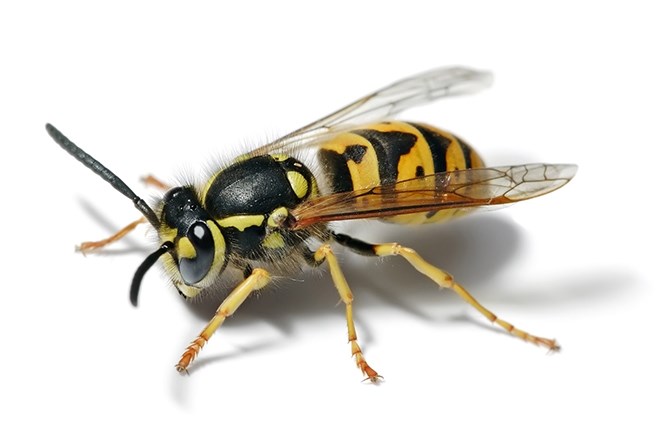
Some species of the yellowjacket wasp become particularly annoying at outdoor eating events this time of year.
Image Credit: Wikimedia commons
Republished September 03, 2022 - 3:19 PM
Original Publication Date September 01, 2020 - 5:24 PM
With September comes the last pleasant summer days and evenings to enjoy meals outdoors.
Unfortunately, it’s also the time of year when we’re faced with an increasing multitude of pesky wasps around the barbecue and dinner table, often turning a pleasant evening into a battle to keep the insects away and avoid getting stung.
Claudia Copley, Royal B.C. Museum Collection Manager and Researcher, Entomology, says wasp barbecue invasions are an annual event, with the exact timing depending on where you live.
“Wasp colonies begin to deteriorate this time of year, when the queen dies and new queens are produced for next year. The female worker wasps are suddenly lacking the coordinating influence of the queen,” Copley says.
She is talking specifically about yellow jackets. Copley says there are many different species of wasps, with many different behaviours.
Copley says the worker wasps – all female – are always out collecting nectar to provide energy for themselves.
When they are foraging, they are actually looking for meat for their larva, unlike a honeybee which brings nectar back to the colony.
“The meat is most often in the form of other insects. I remind people wasps provide a benefit because they will eat non-beneficial garden insects like caterpillars. They can be an important biological tool,” she says.
The meat is fed to the larva. Some yellow jackets also feed on carrion, which Copley says also provides a benefit to nature by serving as part of a ‘cleanup crew,’ but when you’re outside barbecuing steak or salmon, those species attracted to carrion become your unwelcome dinner guests.
Copley says the problem is exacerbated in late summer when colonies have had the season to build up in numbers.
It’s more noticeable now because more workers than ever are out foraging.
“The colony is bigger, and it’s breaking down. Things aren’t great at home. There are more workers, it’s everyone for themselves, and the colony is uncoordinated,” she says.
When it comes to wasp behaviour, aggressive is the wrong word to use. Copley says a more appropriate word is ‘defensive.’
“You have to go near the nest or physically threaten them to have them attack. Humans don’t offer them anything they want. We’re not an intended target,” she says.
Outdoor eaters can use wasp traps to help control the unwanted dinner guests. Copley says some people will use a discarded piece of meat as bait, leaving it away from the dining and cooking area in the hope the wasps will concentrate on it because they aren’t being swatted at.
“There are only a few species that bother us, so don’t hate them. We probably shouldn’t hate them at all, because they are beneficial and for the most part are an important part of the ecosystem,” Copley says.
To contact a reporter for this story, email Steve Arstad or call 250-488-3065 or email the editor. You can also submit photos, videos or news tips to tips@infonews.ca and be entered to win a monthly prize draw.
We welcome your comments and opinions on our stories but play nice. We won't censor or delete comments unless they contain off-topic statements or links, unnecessary vulgarity, false facts, spam or obviously fake profiles. If you have any concerns about what you see in comments, email the editor in the link above.
News from © iNFOnews, 2022